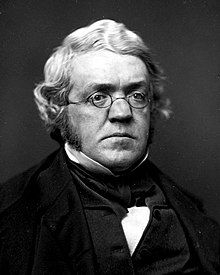William Makepeace Thackeray
| William Makepeace Thackeray | |
|---|---|

1855 daguerreotype of William Makepeace Thackeray
|
|
| Born |
18 July 1811 Calcutta, British India |
| Died | 24 December 1863 (aged 52) London, England, UK |
| Occupation | Novelist, poet |
| Nationality | English |
| Period | 1829–1864 (published posthumously) |
| Genre | Historical fiction |
| Notable works | Vanity Fair |
| Spouse | Isabella Gethin Shawe |
| Children |
|
William Makepeace Thackeray (/ˈθækəri/; 18 July 1811 – 24 December 1863) was an English novelist of the 19th century. He is known for his satirical works, particularly Vanity Fair, a panoramic portrait of English society.
Thackeray, an only child, was born in Calcutta, British India, where his father, Richmond Thackeray (1 September 1781 – 13 September 1815), was secretary to the Board of Revenue in the British East India Company. His mother, Anne Becher (1792–1864), was the second daughter of Harriet Becher and John Harman Becher, who was also a secretary (writer) for the East India Company.
Richmond died in 1815, which caused Anne to send her son to England in 1816, while she remained in British India. The ship on which he travelled made a short stopover at St. Helena, where the imprisoned Napoleon was pointed out to him. Once in England he was educated at schools in Southampton and Chiswick, and then at Charterhouse School, where he became a close friend of John Leech. Thackeray disliked Charterhouse, and parodied it in his fiction as "Slaughterhouse". Nevertheless, Thackeray was honoured in the Charterhouse Chapel with a monument after his death. Illness in his last year there, during which he reportedly grew to his full height of six foot three, postponed his matriculation at Trinity College, Cambridge, until February 1829.Never too keen on academic studies, Thackeray left Cambridge in 1830, but some of his earliest published writing appeared in two university periodicals, The Snob and The Gownsman.
Thackeray then travelled for some time on the continent, visiting Paris and Weimar, where he met Goethe. He returned to England and began to study law at the Middle Temple, but soon gave that up. On reaching the age of 21 he came into his inheritance from his father, but he squandered much of it on gambling and on funding two unsuccessful newspapers, The National Standard and The Constitutional, for which he had hoped to write. He also lost a good part of his fortune in the collapse of two Indian banks. Forced to consider a profession to support himself, he turned first to art, which he studied in Paris, but did not pursue it, except in later years as the illustrator of some of his own novels and other writings.
...
Wikipedia
